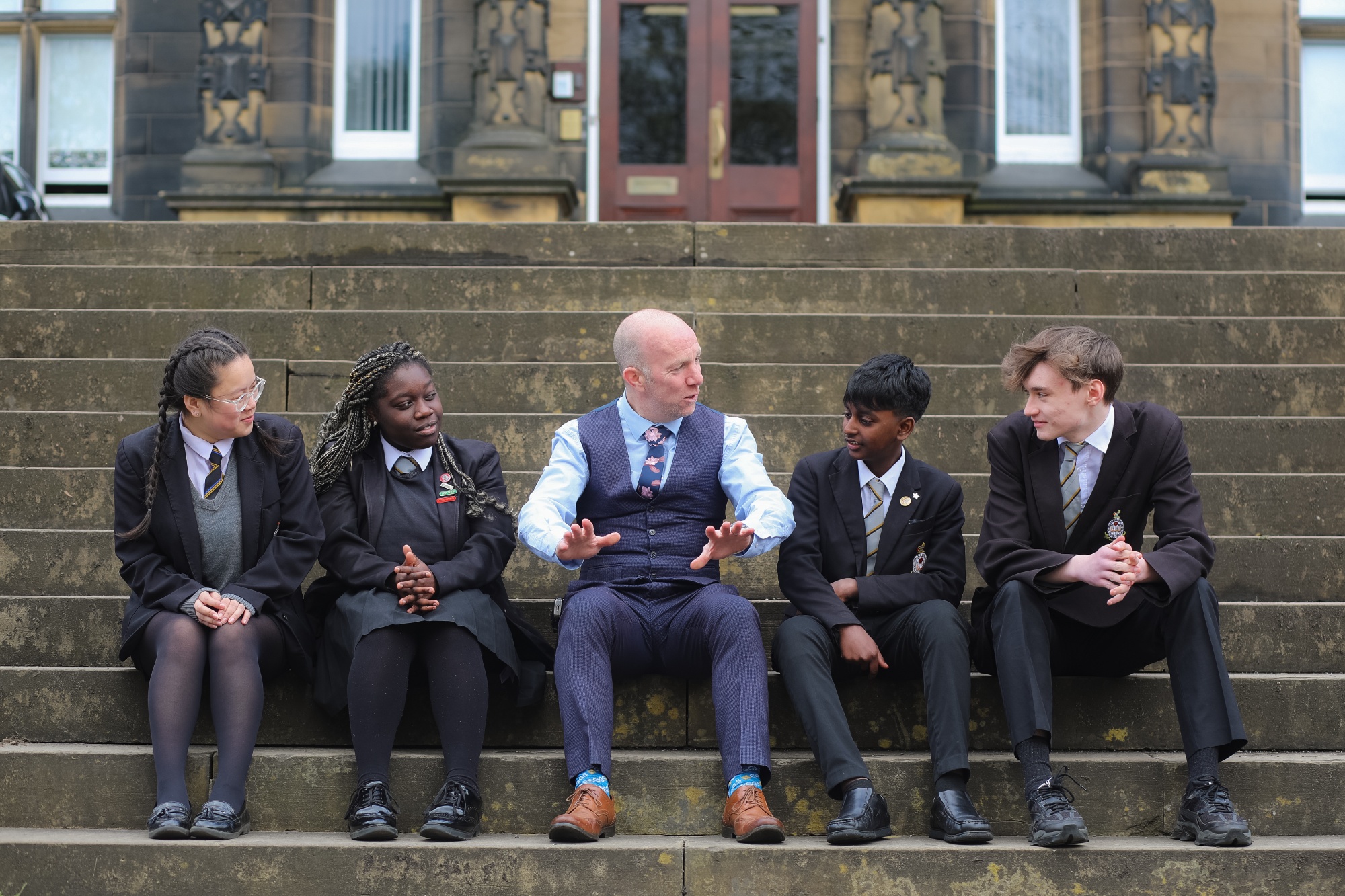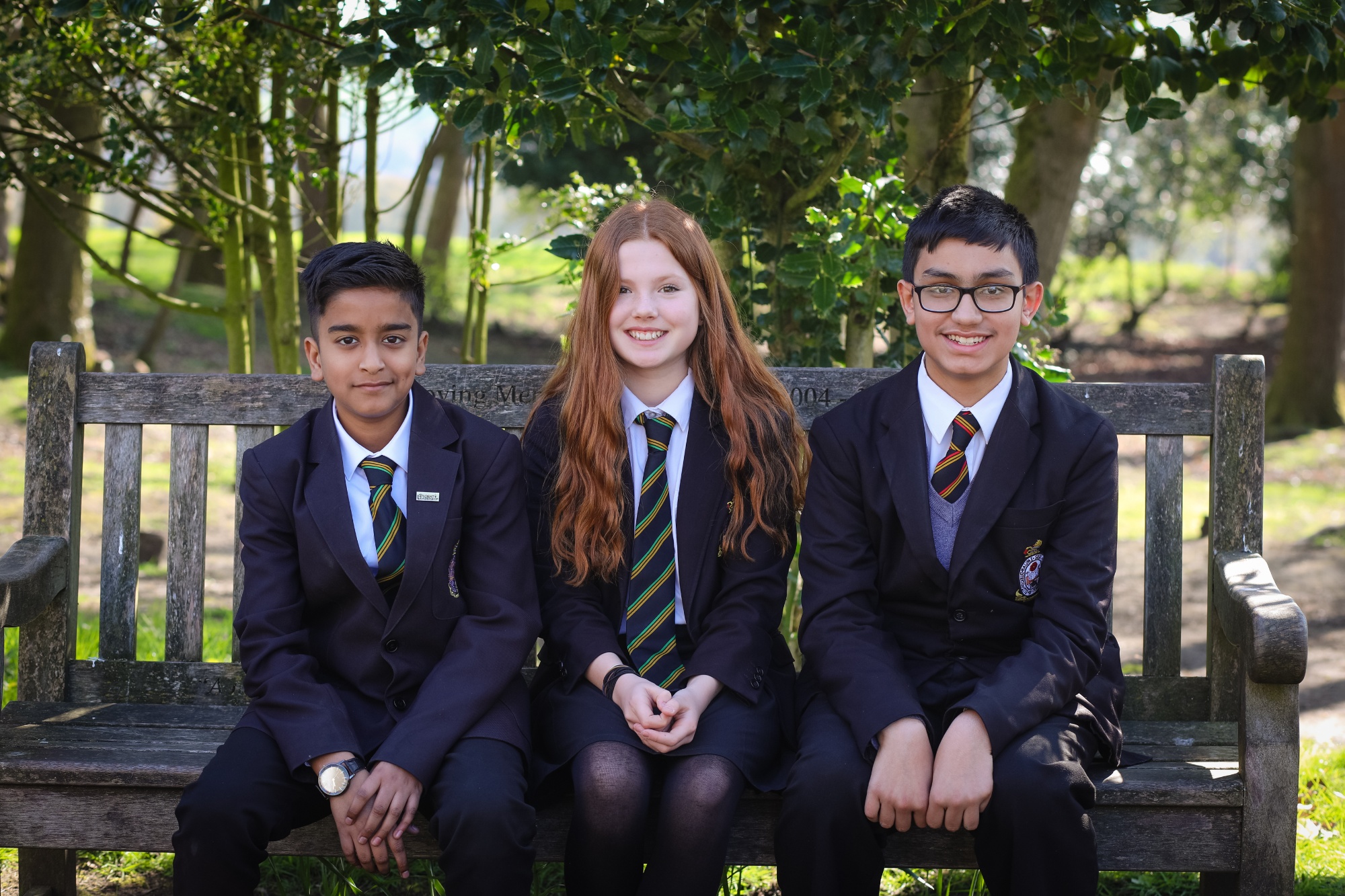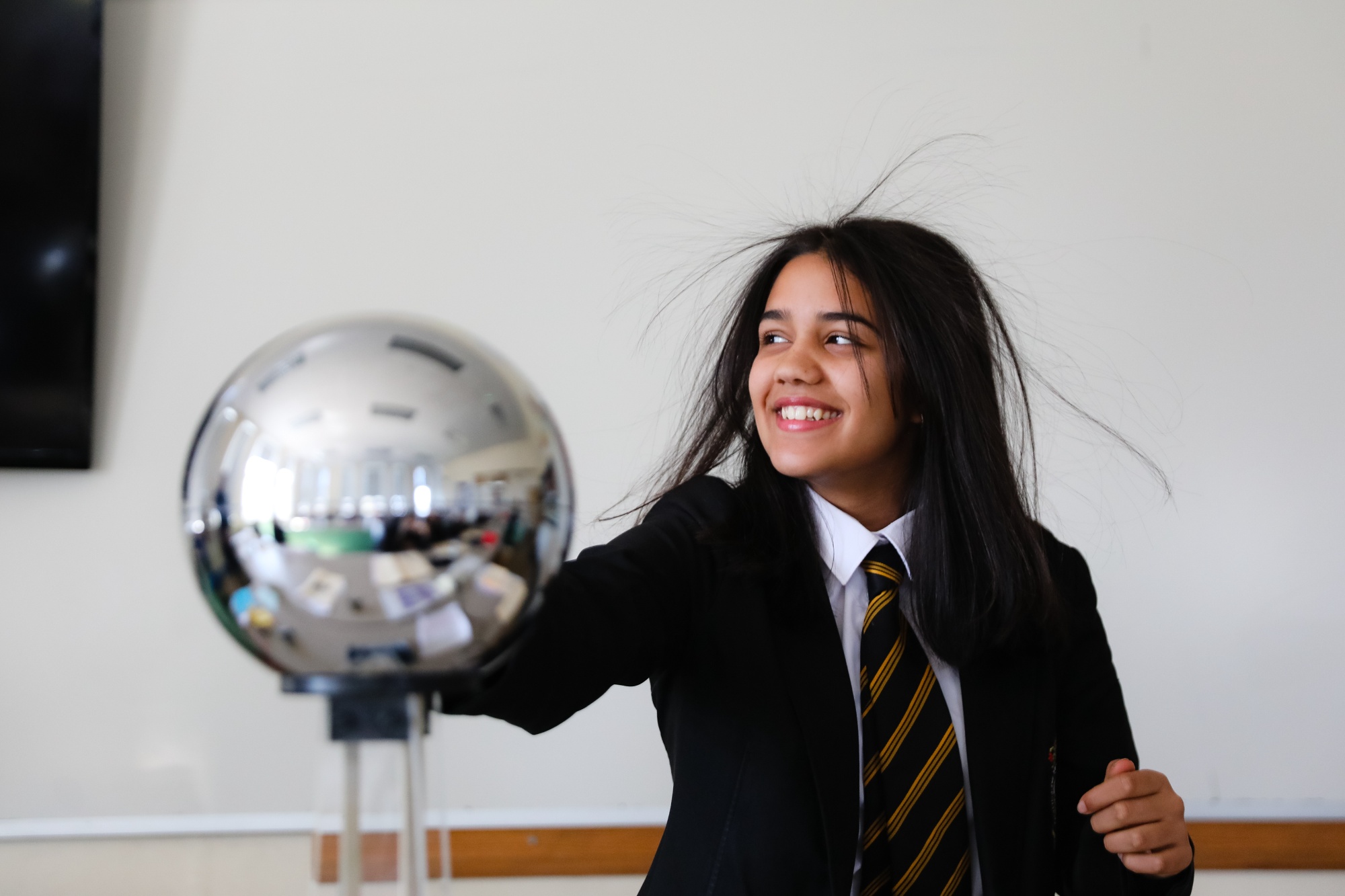Music

The curriculum is designed around the golden threads of technical (instrumental technique and notation), constructive (knowledge, analysis of and use of the musical elements) and expressive (music history, culture, purpose and meaning). These are our three ‘pillars of progression.’
Our intention is to equip students with skills in listening to and appraising music, composing music and performing music through our challenging and exciting curriculum. This intention is regardless of their starting point and previous musical experience. Students are encouraged to have high aspirations as we seek to build their confidence and resilience in music making.
Lessons are designed to have a level of independence to them and our paperless curriculum model allows students to record their progress through video and photographic evidence using iPads. We model instrumental skills and techniques before encouraging students to work at this themselves and also provide digital help.
The implementation is centred on the elements of music represented with the acronym DR T SMITH. This is first introduced right at the beginning of Key Stage 3. Students then apply this to building skills on instruments such as the keyboard, ukulele and guitar. They study the musical cultures and traditions of different countries as well as learning to compose idiomatically for a range of different audiences.
At GCSE, students further apply their analytical skills to a range of different pieces of different styles and genres. They specialise in solo performing and also ensemble performance and they compose to a brief, but also in a free and creative way allowing them to explore their own musical tastes and influences.
Regular formative feedback across the key stages allow students to develop a growth mindset, resilience and perseverance. Opportunities across the curriculum to perform music, foster self-belief and a culture of mutual respect. Students learn from one another and from the feedback and advice of their peers as they develop as musicians.
Students are taught about the importance of music in culture and history. Regular trips and opportunities to engage with live music allow students to develop their appreciation of music and allow them to be influenced positively.
We strongly believe that music is a journey, with many different destinations on the way, but a journey in which we equip students to make more music, think more musically and become more musical.
Music at Key Stage 3
At Key Stage 3, students develop their understanding of the musical elements using DR T SMITH as their guide. The curriculum is paperless and they use iPads and an app called Showbie to record their progress and development in their instrumental and composition skills. The skills needed to read, analyse, perform and compose music are explored through specific units on instrumental skills, studying the music of different cultures and countries, arranging music appropriately and composing in a number of different styles. It is a curriculum that builds on student’s skills and knowledge throughout.
| Term 1 | Term 2 | Term 3 | |
|---|---|---|---|
| Year 7 | West African Drumming Students will focus, to begin with, on pulse and how different rhythms fit together. At this stage, they will not need any prior knowledge of notation, and we will not be working with pitched instruments so there is no focus on melody or harmony. Students will experience playing together as an ensemble and how dynamics, structure and texture can be used to create a coherent piece of music. The playing techniques that they will learn are specific to the Djembe drum which most will not have had an opportunity to play before. They will also be crucially introduced to DR T SMITH, the elements of music that are so important to musical knowledge and understanding. Notation Following on from the work that students have done in Unit 1 on pulse and how different rhythms fit together, students will look at traditional notation. They will begin with note values and how to fit rhythmic patterns together. This will culminate in them producing a 4-bar rhythm of their own including dots and rest. They will then look at pitch notation (which was not covered during the last unit as all the work was done on un-tuned percussion instruments). This will prepare them for using the keyboard skills that that will learn during the next unit. Keyboard Skills Having looked at pulse and how different rhythms fit together in Unit 1 and then traditional notation including creating their own 4-bar rhythm and working out note names in the treble clef, students will now apply their knowledge to the keyboard. Good keyboard technique including hand-position and fingering will be covered. Students will also be introduced to the idea of a scale and learn the notes of the Pentatonic scale. |
Chinese Music During the unit they will work out the notes and rhythms of a traditional Chinese melody called Wine Puppet which uses the Pentatonic scale and play it on the keyboard. Good keyboard technique will be built upon. Students will also build on their improvisational skills (first looked at in West African drumming – unit 1) and improvise individually as part of a class Rondo. Other musical structure will also be touched upon. Again, like in the West African unit, students will develop their ability to appreciate the music of a different culture and learn about its origins and characteristics, and its purpose. Ukulele Skills During this unit, students will look at different types of notation (i.e. chord symbols) and the idea of creating chords by playing more than one note at a time. They will be introduced to the aural difference between major and minor chords and look at different chord progressions and how to play various different chord shapes on Ukulele. They will also look at strumming patterns and the rhythmic idea of syncopation will be recapped in the context of strumming patterns. Students will also develop their singing skills in singing some well-known songs. Vocal skills will be worked on more in the next unit. |
'The Passenger' Band Skills In this unit, students are further developing their vocal skills (including vocal technique), keyboard skills (including playing chords in addition to playing one- line melodies) and ukulele skills (using chords they have previously covered but looking at syncopated strumming patterns). Students are building upon their small group ensemble skills that they first looked at during unit 1 (West African Drumming). In groups, they will arrange their own version of a well-known song called ‘the Passenger’ using keyboard, voice, ukulele and other instruments that they have experience playing themselves. Programme Music In this unit, students are looking at the music of several great composers including Prokofiev, Greig and Saint-Saens. They will learn about the different instruments of the orchestra and their families, looking at how the instruments are played and how they relate to other instruments previously studied (keyboard and ukulele plus Djembe and also the traditional instruments of China). They will learn about programme music and how the instruments and DR T SMITH elements can be used to create characters. They will further develop their keyboard skills by playing some programme music themes and also compose their own themes based upon characters using their knowledge of DR T SMITH and building upon improvisation work they have previously done. They will also further develop their listening skills and understanding of how to analyse music using DR T SMITH. |
| Term1 | Term 2 | Term 3 | |
| Year 8 | Samba At the beginning of year 8, we follow a similar pattern to year 7 in starting with a unit that focuses on pulse and rhythm. Complex syncopated patterns are taught and students are exposed to the notation of these patterns. As a whole class, students work together as an ensemble to produce a class Samba ensemble performance. Again, as in previous units that have focused upon the music of a different country, students will develop their ability to appreciate the music of a different culture and learn about its origins and characteristics, and its purpose. We also look at the traditional instruments that are used in Samba music and have a class Samba set of instruments. Guitar Skills This unit follows on from and builds upon the Ukulele Skills unit from year 7. Students will look at the shapes for the most common Primary and Secondary chords and play some well-known songs. They will build upon their knowledge of song structure (also from ‘Passenger’ unit) and complex strumming patterns using syncopation (first experienced in the very first topic in year 7). They will extend their knowledge of notation (first looked at in Notation scheme Unit 2 Year 7) by not only looking at chord diagrams but also guitar tab notation. The idea of riffs will be touched upon. Students will listen to and analyse a range of different songs using DR T SMITH. They will extend their harmonic knowledge by learning how to work out the notes in different chord shapes. they will also develop their ensemble skills further in performing along with backing tracks. |
Blues This unit follows on from Unit 2 Guitar Skills. During that unit, students looked at the shapes for the most common Primary and Secondary chords and play some well-known songs. Now, students are looking more at the technical construction of chords using root, third and fifth and how they can be structured together in a pattern (i.e. the 12-bar Blues). They will extend their knowledge of chords by looking at inversions. They will build on their knowledge of melody, having previously looked at the Dorian mode scale, Pentatonic scale and other patterns of notes, to look at how the Blues scale in constructed and how it can be used to improvise melodies in a similar way to the Pentatonic scale in Chinese music. Students will listen to and analyse a range of different songs using DR T SMITH. They will look at the fingerprints of the Blues style. They will further build upon their ensemble skills having done the Passenger and West African Drumming units in year 7 and some ensemble playing (i.e. performing along with backing tracks) in unit 2. |
Band Skills The two previous units covered chords and chord progressions and in the Blues unit students were introduced to inversions. During this unit, students will play instruments previously introduced (keyboard, ukulele, guitar and possibly bass guitar) in similar combinations to the Passenger unit of year 7 but arranging a chosen song rather than a given song. To do this they will use resource/lead sheets using chord diagrams, staff notation and TAB notation. Students will continue to build on their listening skills and musical vocabulary using DR T SMITH. Film Music This unit follows on from previous units that have covered chords, chord progressions and inversions. It also links to the year 7 unit on Programme Music where students explored the concept of storytelling through music and how to use different scales to create melodies of certain moods. During this unit students will recap notation in both treble and bass clef and continue to develop their keyboard skills when learning a famous leitmotif. They will build on their knowledge of chords, ostinato and improvisation to develop a group composition to accompany a short film clip. Students will listen to and analyse a range of different film music extracts using DR T SMITH. They will look at the origins of music for film covering musical cliches and leitmotif. |
| Term1 | Term 2 | Term 3 | |
| Year 9 | Salsa This unit follows on from Guitar Skills and Blues from year 8. Both these units covered chords, chord progressions and in the Blues unit students were introduced to inversions. Students will build on their knowledge of melody and improvisation using both aural skills and different types of notation to learn the melodies. They will play instruments previously introduced (keyboard, ukulele, guitar and samba drums) in new combinations, and now with the addition of the bass guitar. Building on the chord diagrams, staff notation and TAB notation previously covered, students will develop their skill in becoming more fluent note readers. Students will listen to and analyse a range of different songs using DR T SMITH . They will look at the origins and fingerprints of Salsa. They will further build upon their ensemble skills playing along to both the backing track and building an ensemble arrangement of ‘Toca Bonito’. Pop Song Arrangement At this stage, students will have developed skills on keyboard, ukulele, guitar, bass guitar and other percussion instruments in lessons. They have covered traditional and other forms of notation including chord diagrams and guitar tab. Students have looked at how to build chords using the root, third and fifth, what chord inversions are and the difference between major and minor chords (both by sound and technically in how to work them out). In this unit they will be used to working together as an ensemble and have an understanding of how band instruments work together so they will further their ensemble skills in producing an arrangement of a given song. There will be more focus here at looking at the fingerprints of different styles of music, and therefore their arrangement will be in a different style to the original. They will use their knowledge of DR T SMITH to produce this as a group ensemble performance. |
Song Writing Having looked at different styles of music and how DR T SMITH can be used to produce an effective arrangement of a pop song, students will write their own song starting with a chorus. They will use their knowledge of chords and chord progressions along with riffs and melodies to compose and perform a song. They will also write the lyrics for their song. Again, their ensemble skills will be developed working in small groups and producing a performance of their song. |
Leimotif and Notation Software During the film music unit of year 8, students looked at how to play a famous leitmotif on keyboard and also developed a group composition to accompany a short film clip. In this unit the idea of leitmotif will be developed as students will consider DR T SMITH in creating a heroic leitmotif suitable for a storyboard of an action film. Also, during the unit, students will build upon their notation knowledge and learn how to use notation software (Noteflight). This is valuable experience for composing at GCSE. Sequencing Software Having looked at notation software, in this unit students will learn how to use sequencing software and how to compose using technology. They will look at Ableton specifically and how this type of software can be used to enhance composition. Again, this is valuable experience for composing at GCSE. |
GCSE Curriculum
For GCSE, students analyse pieces in detail using their knowledge of DR T SMITH and the elements of music. They develop their skills in comparing, contrasting and evaluating different pieces of unfamiliar music but also two pieces set by the exam board. They further develop their creativity in composition, employing the different techniques learnt and practised in producing two high quality compositions; one based on a given brief and the other free allowing them to explore their own identity as musician. They also further develop their performance skills in producing a solo performance on their first study instrument, and an ensemble performance that demonstrates their ability to adapt to and work together with other musicians.
A Level Music
At A-level, the structure of the course is very similar to GCSE. Students continue to develop their understanding of how music works through critical analysis and the ability to make informed and evaluative judgements. Again, they are expected to apply their skills in analysing, comparing and contrasting pieces that they are unfamiliar with and some set by the exam board. Performing and composing are still important aspects of the course and students are expected to perform at around grade 7 standard on their first study instrument. Compositions are free and allow students further opportunity to develop their own creative musical identity.
The enriched curriculum
We are committed to the whole-school intent regarding extra-curricular and offer a wide range of opportunities available from year 7 up to year 13.
Some of these groups require students to have prior experience of different instrument i.e. Crossley Brass, Big Band and Guitar Club but others such as Music Theory and Choir are available to all. We strongly believe in an inclusive enriched curriculum and each group is available across all year groups. This provides younger students with role-models and mentors to work with through their musical journey.
Being involved in the enriched curriculum gives students opportunities to perform in concerts and events such as House Music, Prize-Giving, Concerts and Showcases. We host an annual piano festival and look to take our enrichment groups on concert tours to various places throughout Europe.
Eight Instrumental peripatetic teachers come into school weekly to deliver one-to-one instrumental lessons to around 140 students across all year groups. The teachers prepare students for instrumental exams using a range of exam boards including ABRSM, Trinity and Rock School. As a school, we are a recognised centre for ABRSM examinations and regularly host exam sessions.












